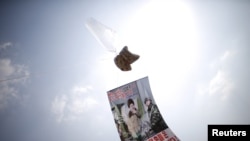South Korea’s National Assembly has passed a law that penalizes activists who send anti-North Korean material across the border.
Human rights groups have for years sent items such as leaflets, USB sticks, money and Bible verses to North Korea, mostly by way of large balloons that are carried by wind over the demilitarized zone. But after South Korea’s ruling party successfully pushed through new legislation in the country’s parliament on Monday, dispatching any unauthorized material is now illegal.
The measure will largely impact activists, including North Korean defector-led organizations and Christian missionaries, whose balloon launches have drawn international media attention as well as condemnation from governments in both Pyongyang and more recently Seoul.
Once in effect, those convicted of violating the so-called anti-leaflet law face fines of up to 30-million won (roughly $27-thousand) as well as up to three years in prison.
Park Sang-hak, a defector whose group Fighters For A Free North Korea has launched balloons filled with anti-Pyongyang flyers for over a decade from below the border, says he’s “disappointed” about the new law and claims it calls South Korea’s commitment to democracy into question.
“We risked our lives to find freedom in South Korea,” he told VOA News. “I am not sure whether this is the Seoul-government making this law or Pyongyang.”
Some of the leaflets that Park’s group has sent to North Korea include information that is banned inside the country, such as news about the 2017 murder of Kim Jong-nam, the half brother of ruler Kim Jong Un. Pyongyang is widely believed to have ordered his death.
“The leaflets tell North Koreans the truth about the brutality of the Kim dynasty,” he said.
The new law comes as dialogue between Seoul and Pyongyang is virtually non-existent. And critics, including Park, accuse the South Korean government of caving into pressure from the north to stop the balloon launches.
Seoul’s efforts to prevent activists from sending materials to the north has also drawn criticism from human rights groups that say the new law “compromises” freedom of expression in South Korea.
“It doesn’t send a good signal to North Korea,” said Arnold Fang, East Asia researcher for the international rights group Amnesty International. “”It shows that any government can limit freedom of expression through new rules and that is not a good sign.”
“What the South Korean government should be doing is promoting freedom of expression in North Korea which is so limited already,” said Fang, who spoke by Skype with VOA News from Hong Kong.
He added it appears Seoul took this step at the “request of North Korea.”
In June, North Korea cut-off cross-border military hotlines and demolished a jointly run liaison office on its territory that was opened two-years earlier to improve communication between governments.
Kim Yo Jung, the powerful sister of North Korea’s leader, blamed the leafleting campaigns of defector organizations in the south for the breakdown of relations, calling them “human scum” in official media.
The regime has threatened to attack the activists on South Korean soil.
In 2014, the two Koreas exchanged fire across the demilitarized zone following a balloon launch organized by activists near the border. There were no reports of casualties or significant damage.
Song Young-gil, a National Assembly representative from President Moon Jae-in’s Democratic Party, cited this security concern as justification for passing the anti-leaflet measure.
“Balloon activities can provoke military action which can be easily escalated to local war or even full-scale war,” he wrote in an editorial published by the Korea Herald on Sunday.
“Freedom of expression is important, but the most important matter is to protect the Korean people’s lives and properties,” Song wrote.
During a 2018 summit between Moon Jae-in and Kim Jong Un, the two leaders agreed to halt propaganda campaigns, including leaflet drops.
Until that time, flyers depicting anti-South Korea slogans and imagery were often found in regions below the border as well as on the streets of Seoul.
Despite government warnings and police blockades of launch sites, some South Korea-based activist groups continued sending material to the north, although it is unclear how many flyers reached their intended readers.
Defector Park Sang Hak is reportedly considering appealing the new law to South Korea’s Constitutional Court, according to his lawyer Lee Heon, the Yonhap News Agency reported.
Park told VOA News that for now, he and other activists will not accept the government’s ban.
“If the government wants to send us to prison, they can go ahead and jail us,” Park said . “We are not going to stop sending the leaflets.”
Juhyun Lee contributed to this report.




